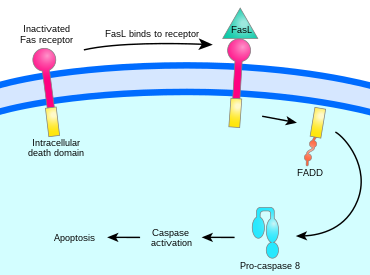
AICD (activation-induced cell death) is programmed cell death caused by the interaction of Fas receptors (Fas, CD95) and Fas ligands (FasL, CD95 ligand).[1] AICD is a negative regulator of activated T lymphocytes that results from repeated stimulation of their T-cell receptors (TCR) and helps to maintain peripheral immune tolerance.[2] Alteration of the process may lead to autoimmune diseases.[1]
The AICD effector cell is one that expresses FasL, and apoptosis is induced in the cell expressing the Fas receptor. Both activated T cells and B cells express Fas and undergo clonal deletion by the AICD mechanism.[3][4] Activated T cells that express both Fas and FasL may be killed by themselves or by each other.[1]
- ^ a b c Zhang J, Xu X, Liu Y. (2004), Activation-Induced Cell Death in T Cells and Autoimmunity. Cell Mol Immunol. 1(3):186-92
- ^ Kabelitz D, Janssen O. (1997), Antigen-induced death of T-lymphocytes. Front Biosci. 2:d61-77
- ^ Green DR, Droin N, Pinkoski M. (2003), Activation-induced cell death in T cells. Immunol Rev. 193:70-81
- ^ Donjerković D, Scott DW. (2000), Activation-induced cell death in B lymphocytes. Cell Res. 10(3):179-92